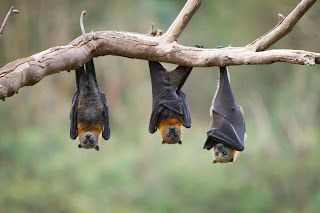It's a bird. It's a place. It's a Bat!
Last
summer I took to the Metro North railways for an overnight excursion in a
tent. I am accustomed to being adventurous when it comes to the
outdoors. You pack your tent, bring some freeze dried food and protein
bars. Don't forget plenty of water. Then you are on your way. I am not the sort for fires and
roasting.
I
love the outdoors as far as the fauna and flora are concerned. However, some of the fauna creeps me out a
little. Occasionally, in the middle of
the night you can hear chirping. That’s
not a big deal but it’s the high-pitched sounds reminiscent of Transylvania
that will get to me sometimes. So I began
to wonder to myself: Are bats dangerous?
What if you accidently camp under their hangout? Like some animals, will
they attack?
I
found myself recently discussing this with a friend and was put in contact with
a researcher at Kennesaw State University named Linda Purvis. She agreed to help sort this out for me.
Recently,
there has been a decline in the bat population of North America. Conservationists are trying to figure out
what is happening. As for me, I just
don’t want to be bitten and turned into a creature of the night.
I
asked her, why did you choose to go into this field?
I wanted to do my graduate studies in non-game wildlife biology and was a good candidate for the lab I currently work in.
I
continued, What is your title?
My title is Graduate Research Assistant at Kennesaw State University, Department of Ecology, Evolution, and Organismal Biology.
With
increasing trepidation I asked, am I a candidate for being feasted upon by the
local bat population while camping?
There is a long list of myths associated with bats, but none of them are true. July is peak season for bat activity. Bats typically forage at dusk and near dawn. They are insectivorous so they will forage where any potential food source is located (standing water and light sources).
If campers see bats, they should enjoy the opportunity to see them in the wild. They don’t need to worry about all the negative stigma associated with them. However, summer is also maternity roosting season, and certain species will roost in the most interesting places such as in between the barks of pines or within leaf litter. If they come across a pup, don’t try to handle as they are very delicate.
Contact the camp host, local conservationists or state department of natural resources for help.
Thank
you Linda for explaining this to me.
Insectivorous? I am now relieved. Even though they still creep me out, I will
be more appreciative of their presence.
No one need no worry that I may pick up a pup. I’ll leave that to their
mothers.



No comments:
Post a Comment